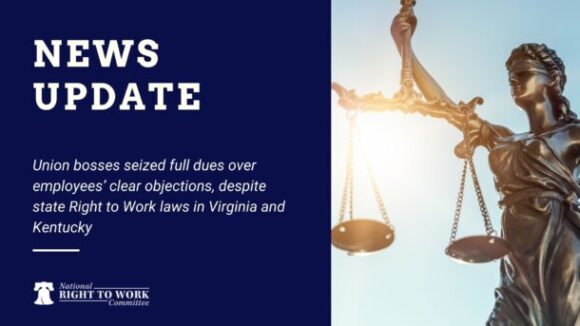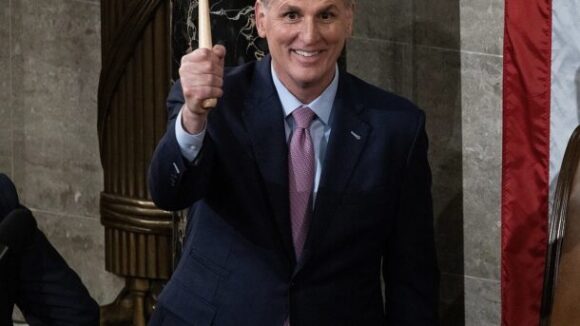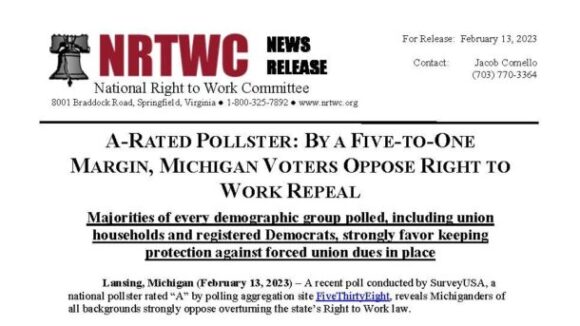Virginia, Kentucky Workers Slam Union Officials with Charges for Illegal Dues Deductions
Union bosses seized full dues over employees’ clear objections, despite state Right to Work laws in Virginia and Kentucky
Big labor has their wish list of legislative and administrative items and its growing by the minute. The latest demand is to change the law to make it easier to force thousands of airline workers to pay union dues and join a union.
The Wall Street Journal objects to big labor’s “end around the law to organize Delta” airlines:
No trucks from Mexico, no new trade agreements, a sweet deal for the United Auto Workers at GM and Chrysler, tariffs on Chinese tires, and now Big Labor has another demand of the Obama Administration: Overturn 75 years of labor policy to sandbag Delta Airlines and unionize transportation workers. Will it get that too?
The latest looming political favor features the National Mediation Board, the federal agency established in 1934 under the Railway Labor Act to oversee labor relations in the air and rail industries. A department of the AFL-CIO last month sent a letter demanding that the board tear up longstanding rules requiring that a majority of all airline or rail workers vote in favor of union representation to win union certification.
The AFL-CIO instead wants a “minority rule,” requiring only a majority of the employees who actually vote. Under current rules, if an airline has 10,000 nonunion flight attendants, 5,001 must vote yes to unionize. Under the union proposal if only 2,000 of 10,000 vote, and 1,001 vote yes, all 10,000 become subject to unionization.
The timing here is nakedly opportunistic. Two of Delta’s unions—the Association of Flight Attendants and the International Association of Machinists—have elections pending in front of the Mediation Board as a result of last year’s Delta acquisition of Northwest Airlines. Northwest was largely unionized but Delta wasn’t. The Delta flight attendants tried to unionize last year but lost that election, and now the AFL-CIO wants the White House to stack the deck in their favor. Beyond Delta, the new rules would make it easier to unionize JetBlue, Continental, FedEx and short-line railroads, among others.
The skids may be greased because President Obama has already remade the three-person Mediation Board with a union-friendly majority. Harry Hoglander, once president of a pilots union, was confirmed in July to another term. The new chairman is Linda Puchala, who was formerly president of . . . the Association of Flight Attendants. A 2-to-1 vote will carry the day.
The union says it merely wants an election governed by the same rules that apply to nontransport industries under the National Labor Relations Act. But the Railway Labor Act was written because the government viewed transportation as economically vital, and one of the law’s purposes is to avoid damaging strikes. Every Mediation Board since 1934 has upheld the majority rule, on grounds that “certification based upon majority participation promotes harmonious labor relations. A union without majority support cannot be as effective in negotiations as a union selected by a process which assures that a majority of employees desire representation.”
The Railway Labor Act also offers no direct way for workers to decertify a union once it is in place, which is why the law provides the initial safeguard of a majority vote. The Supreme Court has twice upheld the majority rule, and the Mediation Board has four times rejected requests to change it, as recently as last year. The majority rule has been used in more than 1,850 elections, and unions have won more than 65% of the time. At least one Board (under the Carter Presidency, note) bluntly said that only Congress could change the voting rules.
Speaking of Congress, we’d note that Democrats are conveniently silent on this proposal. It was only a year ago that Reps. Jim Oberstar and George Miller and Sen. Ted Kennedy sent an outraged letter to the Board (then dominated by Bush appointees) over its proposal to change certain rules in the middle of the Delta-Northwest merger. Mr. Hoglander, still on the Board, complained then that any policy revision in the middle of the merger would “strengthen the perception of bias and sow distrust and suspicion.”
Yet even though the AFL-CIO is demanding that different voting rules be applied to employees affected by the same merger, and even though it would appear the current Board is holding up the two Delta elections until it has time to push a rule-change through (the Board has allowed other elections to proceed), the Democrats have gone mum. At the very least, the Board ought to be following the procedures it has used in the past to consider voting changes, which is to conduct extensive evidentiary hearings.
We’ve long thought the Railway Labor Act should be rewritten for numerous reasons, but that is Congress’s job. The administrative reversal of precedent being sought in the Delta case would invite a legal challenge, and courts look skeptically on agencies that put capricious politicking ahead of statute and decades of case law.
The airline industry is already in enough financial trouble without being strong-armed to bear the additional costs of greater unionization. If unions want to organize Delta, they have every right to do so by persuading a majority of workers. Meanwhile, the Obama Administration’s willingness to twist the law to help its union allies is unlike anything Washington and business have seen in a very long time.

Union bosses seized full dues over employees’ clear objections, despite state Right to Work laws in Virginia and Kentucky

Speaker Kevin McCarthy has vowed that the House will “use the power of the purse” to “check” Big Labor President Joe Biden’s policies.

A recent poll conducted by SurveyUSA, a national pollster rated “A” by polling aggregation site FiveThirtyEight, reveals Michiganders of all backgrounds strongly oppose overturning the state’s Right to Work law.